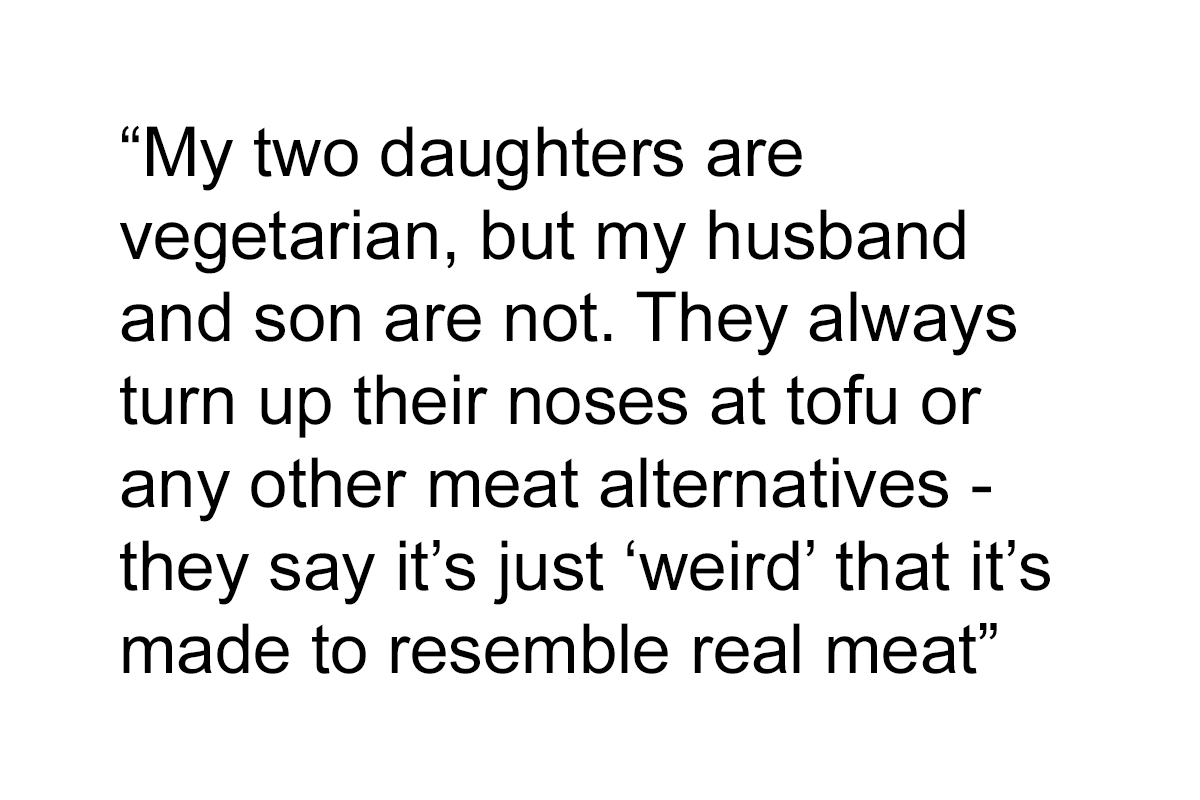
“My Son And Husband Always Turn Up Their Noses At Meat Alternatives”: Woman Serves Fake Meat To See If They Actually Hate It
We like to think that everyone’s dietary preferences are valid (so long as they don’t devour just sugar and caffeine all day long—that ain’t healthy, not by a long shot). For instance, yours truly is an omnivore: I eat meat, veggies, and… way too much sugar. I enjoy meat, I won’t pretend I don’t. However, I also recognize the health benefits of a vegan diet, as well as the moral dilemmas associated with how animals are raised. I’m open to trying out new dishes, but I also have a soft spot for pizza.
Warm discussions and open-minded experimentation can open up quite a few doors in our gastronomic journey through life. What doesn’t work well is when someone tries to cudgel someone into submitting to their dietary beliefs. Very few people enjoy being tricked, coerced, or threatened into accepting someone else’s beliefs—whether related to food or not.
That’s where one redditor’s post on the AITA subreddit comes in. The woman asked the net for their verdict on whether or not she was a jerk for parking her non-vegetarian husband and son into eating fake meat. Scroll down for the full story, as well as the discussion about free will and food ethics that the post sparked on Reddit.
Who do you think was in the wrong here? Do you think the mom was a jerk for tricking her non-vegetarian family members? Would your opinion change if the situation were reversed? Do you think the situation is simple and clear-cut or touches upon some deeper ethical issues than people might not see at first glance? Share your thoughts—and your verdict!—in the comments, dear Pandas.
Bored Panda had a chat with Jessica Leigh Clark-Bojin about food hangups, why it might be a bad idea to trick someone into eating something, and how to actually convince them to try some new dishes instead. (Spoiler warning: bribery works!) Jessica is a world-renowned pie artist, food expert, and the author of ‘Pies Are Awesome.’
She told us that there are quite a few nuances that we have to consider before tricking someone when it comes to food: from their potential allergies and religious beliefs to whether or not they actually have a good sense of humor. It’s incredibly important to think of the consequences of your prank. You’ll find the full interview below, Pandas.
Our food choices, like whether or not we consume animal products, can lead to some serious arguments, even among relatives
Image credits: cottonbro (not the actual photo)
One woman shared how she tricked her husband and son with some fake meat. She then asked the internet if she was wrong to do so
Image credits: Klaus Nielsen (not the actual photo)
Though opinion was divided online about whether or not the mom was in the wrong, at the end of the day, the majority of AITA community members decided that the OP did something morally wrong. Essentially, she took away her husband and son’s ability to choose.
Free will is a huge deal. Nobody likes losing control or feeling like they were manipulated. You could even argue that even if the taste of the fake meat was fine, the very fact that there was some darn trickery going on will push the two men away from turning vegetarian. I know that I’d be quite annoyed if someone was toying around with my food and my feelings.
There’s also an apparent danger that the OP might not have considered. Say this wasn’t her family that she tried to prank, but some guest. Who’s to say that they weren’t allergic to some ingredient in the dish? It’s dangerous to play around with people’s expectations, especially if you don’t know how they might react to certain ingredients.
Pie artist and culinary expert Jessica told Bored Panda that everyone has at least some weird beliefs about food. “Let’s face it, we all have dietary hang-ups that stem from obscure little childhood traumas and beliefs,” she said that some might think that mushrooms are slimy and gross while others think that peas are mushy and that’s why they hate them.
“Many of these long-held beliefs about what foods we like and don’t like don’t stand up to scrutiny. For the longest time, I thought I hated broccoli. Turns out, I just hated the way my British grandmother boiled them within an inch of their life until they were nothing but a sickly yellow mockery of real broccoli. The first time I had ‘real’ broccoli, lightly steamed with shaved toasted almonds, I realized my mistake, and ever since broccoli has been a staple of my diet,” she shared how a quality gastronomic experience can shatter previously held beliefs.
However, Jessica had a warning for anyone who’s thinking of pranking someone else and tricking them into trying something they might dislike.
“Before go we nuts planning our clever culinary capers to trick friends and loved ones into trying the foods they ‘hate’ in a new and improved format, we need to make some important calculations:
- Does the person you are about to trick have any actual food allergies, and could potentially be harmed by your dish?
Does the person you are about to trick have any strong spiritual or religious beliefs associated with their diet, or has made it clear they have zero interest in eating a certain food, and would feel they have violated their principles in eating the food you are about to serve?
Does the person you are about to trick have a sense of humor and adventure? Would they be amused at your deception, or pissed off that they have been lied to?”
The culinary expert stressed that by answering these questions, people can then see if they should go ahead with pulling “the ol’ switcheroo” on their friends… or if it’s best to shelve the idea and try a slightly less clandestine approach. “If you don’t know the answer to any of these questions, take that as a ‘no go’ on the ruse!”
We also wanted to get pie artist Jessica’s opinion as to why some individuals are quite aggressive in spreading their dietary beliefs. “Sometimes, people are concerned about the health of a loved one and are hoping to influence their diet in a more positive direction, sometimes people are sick of dealing with an overly fussy child/spouse, sometimes it’s simply a tribalism thing,” she explained that some people tend to think along the lines of, “In this family, we eat meat!” or “In this family, we don’t harm animals!”
“Our reasons can be well-intentioned, and there is certainly nothing wrong with encouraging friends and family to expand their culinary horizons… but tread carefully when it comes to employing deception unless you are prepared to endure the fallout!” Jessica warned.
According to the food expert, she’s a fan of using bribery and quid-pro-quo deals to get someone to try eating something new. For instance, you could tell someone:
- “If you try Beyond Beef, I will watch that show you like with you without complaining.”
- “If you agree to eat no meat for 1 month, I’ll buy you that game console you want.”
- “We can go to that fancy restaurant but you have to at least try a bite of each thing on the tasting menu.”
Of course, this isn’t a comprehensive list. Think about what would compel your family and friends to want to expand their culinary horizons.
“Our connections to food are often emotional in nature and you can’t reason someone out of an emotional position with logical arguments,” Jessica told Bored Panda.
The story provoked a very wide range of opinions about the ethics of what had happened. Here’s what some people had to say about it all
Previously, Bored Panda spoke about the relationship between what we eat and our health with Jack Bly, an entrepreneur and fitness expert from the US. He said that we really can’t out-train a bad diet, so we have to be careful about what we put in our mouths.
“The only people I’ve seen ‘out-train a poor diet’ are athletes who are moving their body a ton. For everyone else, diet needs to be a priority if you want to see real changes in your body. You eat 500 calories in a minute. But it would take an intense hour of exercise to burn those same 500 calories,” he said that we have to be very aware of portion sizes.
According to the fitness expert, if our goal is to limit how much sugar, fast food, and other unhealthy things we eat, then it’s best to optimize our environment for success. That means not keeping any of the food items you’d rather avoid at home. It also means that your family and friends should be aware of what you’re cutting out so they can hold you accountable.
“My meals vary but one principle always remains constant. And that is every single meal I sit down to eat must have a good source of protein in it,” the fitness expert added that anyone aiming for fitness should prioritize protein.
Meanwhile, BBC Future points out the irony that vegetarians are actually more likely to be threatened by vegans than non-vegetarians are. According to some researchers, vegans tend to think that vegetarians are ‘hypocritical.’
What’s more, when vegans try to promote their diet by alluding to the animal suffering that can be prevented, their intentions can backfire. Omnivores tend to find vegans who choose their lifestyle for health reasons more tolerable than ‘ethical’ vegans and vegetarians. Nobody enjoys being judged or interacting with people who believe they have the moral high ground. That can spark a defensive reaction in people and they’ll just double down on whatever eating habits they have now… the ones being judged.
81Kviews
Share on FacebookThere are plenty of people who are vegetarians or vegans out of choice and few people would probably suggest that it's okay to trick them into eating meat. In the case of the post it's the other way around but the principal remains: People's choices should be respected. YTA.
Vegetarians don't eat meat. It is their philosophy. Whereas the meat eaters eat vegetables all the time and in different forms. They have a preconceived idea is all. I am a big meat eater. This should have be considered a simple joke. No one was harmed or even close to it. No trust was broken. You give someone a redhot and they don lose their sh*t over thinking you betrayed them. Lighten up.
Load More Replies...Okay, serious question: how is this different from tricking children into eating veggies? Lots of YTAs were talking about not lying about what food you're giving them and need consent, etc. So why can parents trick their children but an adult can't trick an adult?
I think mainly because it's different dynamics. A parent has Authority over a kid as they presumably have superior knowledge to allow them to do what is best for the kid even when the kid is against such. However presumably you want your spouse to be an equal partnership dynamic. If you saw a husband tell his wife "No, you can't have ice cream." would you feel their relationship was healthy? Yet if you saw a parent do the same to a child how would you feel about their parenting? After all both are the exact same scenario, sole difference is one is spouse other is child. Yet most I've met would say husband is controlling, parent is just properly parenting. Same deal here, spouse decided she had the right to control her spouse's diet thus in some respects infantilizing him by well frankly treating him as one does a child. Now granted he was acting like one about the meals, but that kind of back and forth rather then an open discussion doesn't lend well to an equal partnership
Load More Replies...Never feed anyone anything you haven't specified what's in it. It is not your decision not make. I absolutely despise vegan foods that resemble meat, chicken. I do not enjoy tofu, and will not eat it even if it's last.thing in cupboard. But I love vegan food when it's made as food and not to resemble wings, steak, burgers. All my side dishes are vegan or vegetarian, and I serve them as such. But vegan burger, vegan mince, vegan sausages just is bad. Why promote vegan foods with saving planet and animals and then still saying but we know you can't handle.going meatless.so we have used and processed vegetables to give you that taste back. There's no bad food, but everyone has a right to pick what they like and what they want. Nobody can force you to eat foods you don't like. Here's a better solution each cooks their own meals, and doesn't dictate others menu. Absolutely a*****e, daughters as well. This is disrespectful, imagine if they feed you meat secretly and say vegan
I think part of the reasoning behind making it look like meat is to appeal to non-vegans. The first time I saw tofu was when my wife was cooking with it. To me, it looks like the congealed grease that clogs up sewer lines. I couldn't eat it because that's all I could think about was the gelatinous ooze that I have to deal with at my job.
Load More Replies...Please don't do this. PLEASE. Some people really hve reasons and you don't need to know them even if you're the parent/spouse/sibling/friend/co-worker. Just. Leave. Us. Alone. And that counts leaving alone children who're choosing to be vegan, vegetarian, or whatever ----- if their health isn't at risk, let your child/spouse/whoever eat veggies, etc. I am vegetarian and *refuse* fake meat b/c I just don't like the texture. I don't force someone else to eat raw broccoli or mashed turnips, so leave me alone, okay? OK. Thank you. (over 50, still run into people who think I have to be "shown what I'm missing". No. I don't.)
There's no ages in this, but the son is probably just following the father's lead. I'd just say "If you don't want to eat what I am cooking, there's the kitchen" and have the father cook their meals if they don't want to eat vegetarian. But the thing is, there are plenty, and I mean PLENTY of recipes out there for meals that are meat free but that also don't use meat alternatives. I feel like that would be a pretty good compromise.
I'm the only vegetarian in a house with meat-eaters. The way we do spaghetti sauce is to make it veggie (vegan actually, but coincidentally), and then the rest of the family add slices of meat to theirs. Everybody's happy, less dishes get messy, and there's less work involved. Plus, no mistakes.
Load More Replies...Honestly, why don’t the boys make their own meals once in a while? Men aren’t allergic to cooking their own meals and it’s good to teach growing girls and boys how to enjoy cooking and cleaning up after their own meals.
She did say cooking and cleaning was a shared responsibility, hope that includes the guys and not just the women.
Load More Replies...I don't understand the point they were trying to make, first thing OP said is that husband and son are weirded out by the concept, not by the taste. And to be fair you can't taste healthy, so I stand by the idea that whatever fake meat is hyper-processed and less healthy than just eating veggies or grains.
Tricking someone about what food they're eating to prove a point is wrong. This not the same as hidden veg in the pasta sauce, or even substituting soy mince for half the mince in a recipe to save money. This was outright trickery - misleading them with two pots, in order to triumph over them - "See, you liked it!" it's a violation of trust. It's not as bad as tricking someone into breaking a moral or religious dietary restriction, and in this case, there weren't safety concerns, but it is still an a*****e move. If you wanted to get them to try meat substitutes, you could have proposed a blind taste test, or even made a bet with them that you could use a meat substitute in a future meal, and they wouldn't be able to tell the difference. Instead of comparing it to vegans being fed meat, think about it like the 'flexitarian' or a non-vegetarian being tricked into eating micro-protein (ground bugs) after they had expressed a disgust for the idea.
The equal distribution of cooking and cleaning works how? Do the father and son object to cooking non-meat meals as well as eating, so they do all the cleaning while mother and daughters do all the cooking (two versions of meals)? Or is it truly equal and father and son genuinely do their share of application of heat to tofu based Bolognese? And the trust is there that they really *are* cooking vegetarian versions...? Is there also an equal contribution to the energy and food bills required, since this is twice the effort all round.
I can't post on AITA anymore because I used the word "slap" (lol). But I'd have asked her, "Do you want to be right or do you want a husband?" I lived with a woman like this as a child. We don't know that the men in the family took this stance because the women were pushing them so hard every chance they got. My mom would do that to me, and even if she was right it didn't matter! *I didn't want to because she wanted me to.* This could be the case, especially as the woman here thought this was a great idea.
See with me, this wouldn't work. I have a sensitive palate and would (and have) definitely tasted the difference. Even as a kid, I've heard stories of asking why cereal tasted different when they switched to a store brand instead of the name brand. If I don't like the taste or texture or consistency of it, I usually won't eat it. If they like it, cool, but I agree it is kind of a trust issue now. They wouldn't have liked somebody messing with their food in any way, but this is almost like they're turning it into one of the vegetarians hate meat-eaters type situations (not saying this is how everybody feels, but there's definitely some that get judgmental about it). If it's about dishes, tell them they have to clean the meat dishes.
I've tried some of my wife's alt-meat food. Some weren't bad tasting, others were just not good,and a few of them I couldn't bring myself to taste because they didn't have a very appetizing smell...The thing that puts me off all of them the most is the texture. I'm sure they do the best they can but texture is just awful. Best way I can describe it is grainy. It could be the most wonderful tasting thing in the world, but if the texture is bad, I'd have to be really REALLY hungry to eat it.
Load More Replies...All I know is that if I had to have dinner with this family, it would be at a restaurant. And I'd pick the restaurant.
I wouldn't say it's ok to trick someone to eat something... BUT cooking two separate meals EVERY meal seems exhausting and expensive - I get that. Best option would be if they all could compromise on a menu so at least a few meals are shared and something all could eat (even if it isn't someone's favorite). That's how we do - sit down and decide on a menu so everyone can have what they like sometimes but be able to eat even if it isn't "their" day. In this case I think a mostly veg menu with a few meals with two options (meat/veg).
This person is defintthe AH. Soy is one of the 8 most common food allergies that can lead to anaphylaxis. If someone has said they don’t like soy it could be that it gave them some sort of minor reaction like an upset stomach or other small irritation and they just know it’s not for them but don’t know exactly why. Food allergies tend to get worse with each exposure. She could have literally killed them just to saturate her curiosity and prove some asinine point. Let people eat what they want and don’t lie to them about their food. Had she killed then, she would have been charged with murder
What we have missing here is a bit of OP's own self reflection of what would have been her own reaction if the prank would have conducted opposite way. Would she have been upset if tricked on eating meat or would she have been able to laught for a successful prank.
OP is flexitarian. Meaning that she does eat meat occasionally. The daughters might have flipped though.
Load More Replies...NTA, do this all the time with my husband to prove that eating healthier isn't "gross"
Why not trust an adult man to make his own decisions? - it's not that healthier food is disgusting, it is the marketing of those foods. Why not say this is an oven baked cauliflower with spices, or batter tipped vegetables, instead you market as vegan steak and chicken wings substitute when it isn't. But all food mentioned are great. When you expect 1000 dollars but receive 100 dollars your expectations have been abused. If I want a huge slice of cream and fat cake don't give me fruit salad as it will be disappointing due to expectations being different. Same like catfishing. It isn't a problem if you're up front about yourself, but it becomes immoral and illegal when you disrespect other humans values/needs/taste/. We get one life and most choose to spend it to raise and change other adults around them to match your personal hills. My partner would leave me, I would leave him if he would like about such small thing, then probably won't see problem lying about bigger things.
Load More Replies...Everyone seems to think that is was so serious that the fake sauce was used. I love meat. Italian is one of my favorite dishes. And 99 times out of 100 it has meat in it. I want to make a point how much I love meat. But if no one had said anything, the two would have gone home and the day would have been just like every other day. Birds sang, flowers bloomed, babies cried, lovers kissed. Dad would have watched TV and the son played X-Box. Nothing would have changed. God would not have cared. The devil would not have paid attention. It would have still rained in Brazil. And yet most of you feel that betrayal of the deepest form has taken place. OMG. Don't you even wonder what it must have tasted like if it was that good?
Nope. YTA. BIG time. This is a violation of boundaries. MASSIVE disrespect. For all those people who are saying it's not the same as tricking a vegetarian into eating meat, YES. IT. IS. It doesn't matter if an omnivore still eats vegetables on the side. The omnivore CHOOSES to get their protein from real meat. That is NOT YOUR DECISION to make. YOU violated boundaries. YOU disrespected another person's choices. Period. Full stop. End of discussion. All your excuses are just that: excuses. Don't EVER mess with another person's food. That goes BOTH ways, for the record.
The mother did not elaborate on how she knows for sure that there are no food allergies. Did she have them recently tested? Food allergies can develop over time. Pranks of any kind are awful and perfect ways to allow mistrust in a relationship. They also usually lead to retaliation later on. If she didn’t want to make two dishes then she should tell all parties involved that and either the girls or the guys would need to make their own damn food. This was an AH move and it will come back to haunt her many a time
Simple solution - stop cooking 2 meals. Then they eat what's put in front of them or go hungry or prepare their own meals. Their choice.
I agree — the family should make standard meat & vegetables meals, and let both sides choose what they want to put on their plates.
Load More Replies...I like and agree with what Double-Ad4986 said in the comments above. This situation is ok, the Mum knows full well what Dad and Son like to eat and probably knew it would all work out fine. My niece once gave me Quorn 'chicken dippers' and didn't tell me until after I had eaten them, I was pleasantly surprised. 😊
sneaking meat in to someone's diet is NOT like giving a met free meal to someone for once in a while. There are people that are allergic to meat proteins, that had traumatic experiences with meat, that are vegetarian because of ecological, religious or self-reflection reasons. - there is NO meat eater that eats 100% meat and nothing else and survives only by eating meat.. most of us don't even eat meat every day.... them getting angry about being tricked is just ridiculous because the mother could have just cooked a normal vegetarian meat and they would not have behaved like spoiled children. they are acting as iv they got poisoned because they don't want to admit that meat isn't that special after all.
One time a roommate neglected to tell me the steak he made everyone was actually deer meat. Then he helped himself to the brownies that I made... which were totally full of marijuana. I did not like deer meat and he did not like marijuana. I learned never to eat what other people cook. He learned to ask before taking. OP should be forthcoming about what's in food. Trust is sometimes impossible to regain. YTA
Op is nta. What a huge fuss over a one-off thing to prove a point that harms nobody. Ffs.
Me with a random omnivore, at least once a year: Omnivore: "I could never be vegan because I can't give up the taste of xxx." Me: "So if you were given real xxx and vegan xxxx in a blind test, and you couldn't guess which was which, you could go vegan?" Omnivore: "I didn't say that." Me: "You kinda did."
This omnivore would have said, "sure. Give both to me PLAIN. Then I can guess". I've no issues with tofu and meat alternatives, in sauces! But by themselves it's obvious they're not meat. And I like *meat*. By itself. Because I like the flavor of meat.
Load More Replies...Actually, it's been proven that plants do feel pain, so the person in the second post has a lot of thinking to do. Actually, trees can even talk to eachother and grass sends stress signals to nearby lawns when they are cut. Maybe what they meant is that since they can't talk, and don't have eyes that it's not only something that isn't feeling pain, but that it's guiltless. People can eat whatever they want, but don't try to be a savior about it. As humans and not freaking algae we obtain energy by eating something that already had its own energy and life force, to say just because it doesn't scream when you pick it, it's very different from eating animals is fantastical and simply not true.
Plants ‘feeling’ is mostly reflexes. They don’t have brains and aren’t conscious. No study has said that they can feel, just shown their reactions and how they adapt based on circumstances and can ‘hear’ by feeling vibrations. Also, some people eat vegan/vegetarian because it is better for the environment, not all eat vegan/vegetarian for animals
Load More Replies...There is a *huge* difference between "I do not eat soy" and "fake meat is gross." One is the choice to not consume a certain item; the other is a preconceived bias—proof of that being their inability to tell. I think, in general, you respect autonomous humans' personal choices, but this one (eww fake meat is yucky) is very childish and hard to defend.
Ya know...who are YOU to try and change someone's mind? You would hate it if someone used meat in a recipe to show it's not 'gross' to eat a piece of beef.
Load More Replies...Wife is kind of an AH because of how she went about it because it is a betrayal of trust. It would have been better to have made it into a blind taste test game of which is the real meat. That would have been fun. Then it maybe father and son would be okay with non-meat sausage in the sauce going forward and be open to trying other options in the future. There is a texture difference between meat and veg protein that some people just don't like. It's too weird for them to taste "meat" that doesn't feel like meat.
I have no objection to eating vegetarian but don't know why so many veggie products are made to look like meat. If you don't eat meat, why would you want to eat something that looks like meat? And if you eat meat but are going veggie today, same applies. There's also the texture thing - soy mince feels soft and squishy compared to real mince.
Maybe some people just enjoy the taste of it, but despise the gruesome animal suffering?
Load More Replies...Here’s the thing, I eat both meat and plant based/vegan stuff, but that’s because I know my stomach can handle it, but other people, even unknowingly, could get easily sick from stuff like that, especially cause they’re not used to it. And yeah, also a trust issue thing too. YTA.
Nta, like hell would I be making TWO dinners, they eat what's made or go hungry. Everyone eats veggies, they were fed poison, tell them to chill
I habe only one "beef" with vegetarians (pun intended). When they claim "it tastes just as..." Just be honest. It's meat substitute. Bacon cannot be bacon unless it's made from pork. So just call it what it is
I think the OP in this one is a minor @$$, not because she gave them alt-meat, but because she didn't tell them it was alt-meat. I wonder if the OP would feel it was still a funny prank if the roles were reversed and the husband added a heaping scoop of pureed strawberries to the vegan spaghetti. Husband would get a good laugh as the look of disgust spread across the OP's face as she realized something wasn't right, and I bet OP would be pi$$ed! If someone doesn't want to eat alt-meat, that's their choice, just like someone that doesn't want to eat meat. Respect one another's choice and be cool.
I agree tricking is probably the only way to get the guys to even try, but tricking your partner is not good. I doubt this will have improved anything.
Sorry but if I was the son or dad, oh y'all gonna get some real meat when you least expect. ppl saying not the AH is d deluded how is it okay to switch up theirs just because meat eater still eat vegetables so if that's not what they wanted it's not what they wanted. So they have every right to put real meat into a vegetarian dish and tell them after they done ate it all because they didn't know the difference, wrong is wrong if you can't be fair about something don't try to push your perspective on to someone else.
I trick my husband sometimes as he claims he hates tap water, he only wants to drink bottled water. So I put tap water in fancy bottles and offer him some. He can never tell the difference! (Our tap water is safe to drink and very good, I understand othera might not enjoy their tap water but ours is fine and he knows it!)
NTA. As long as there are no allergies or other health issues involved, it can be a good way to show people how far meat alternatives have come. My sister got my dad to eat vegetarian burritos this way; she waited a few times before telling them, and he is absolutely okay with eating them now. But if he had known what it was the first time, he never would have tried it. Cooking one type of burrito saves heaps of time for her when she visits.
NTA. and i am a meat eater. making it reversed is a completely different thing. meat eaters eat vegetables vegetarians dont eat meat. as they know there are no allergies it is okay. they just wanted to find out if it was just the male ego " i am a man so i wont eat rabbit food" or they really disliked veggie food. i hate veggie meat alternatives but i havent tried many. i do eat some veggie food, no need to have meat every day. they could save a lot of time and money if they cooked just one meal some days
I would have said NTA, but all the YTA's are challenging me. Either way, just apologize and move on.
People thinking this is at all "wrong" are asshats. They eat vegetables, they enjoyed the meal, there was no attempted shaming just a harmless and delicious prank.
The point is not whether or not if they eat vegetables or if they enjoyed the food. The point is she tricked her husband and son into eating something they have clearly said they dislike, just to 'prove' a point.
Load More Replies...It is not morally wrong to feed a meat eater a vegan alternative meal. It IS a moral wrong to trick a vegan into eating meat. Close minded people sometimes need to be "tricked" into trying something they won't just because they are stubborn (Like the OP story). People took this W A Y too far.
I trick you to sex with a man. I trick you into participating in cult I trick you into partaking in Muslim/Christianity/Catholic activities I trick you to eat vegetables that you're allergic to I trick you to jump of a roof I trick you to lay down in a puddle of sick I trick you to eat food that can kill you/make sick Tricking people into doing something that they wouldn't do is not you helping close minded to become open minded. It's you shoveling your own standards down someone else life. If my mum and sisters did this to me, I would have disowned the whole lot of them. Mainly because some common vegetables make me really sick, but also that any fruit veg that isn't peeled makes me bleed, some food triggers sudden vomiting and dry heaving. And all of them make my intestines bleed, and I end up in hospital. This is a new health scare and my family because we live separately doesn't understand it, my partner is careful, my mum is skeptical. But it is not her job to disprove me
Load More Replies...There are plenty of people who are vegetarians or vegans out of choice and few people would probably suggest that it's okay to trick them into eating meat. In the case of the post it's the other way around but the principal remains: People's choices should be respected. YTA.
Vegetarians don't eat meat. It is their philosophy. Whereas the meat eaters eat vegetables all the time and in different forms. They have a preconceived idea is all. I am a big meat eater. This should have be considered a simple joke. No one was harmed or even close to it. No trust was broken. You give someone a redhot and they don lose their sh*t over thinking you betrayed them. Lighten up.
Load More Replies...Okay, serious question: how is this different from tricking children into eating veggies? Lots of YTAs were talking about not lying about what food you're giving them and need consent, etc. So why can parents trick their children but an adult can't trick an adult?
I think mainly because it's different dynamics. A parent has Authority over a kid as they presumably have superior knowledge to allow them to do what is best for the kid even when the kid is against such. However presumably you want your spouse to be an equal partnership dynamic. If you saw a husband tell his wife "No, you can't have ice cream." would you feel their relationship was healthy? Yet if you saw a parent do the same to a child how would you feel about their parenting? After all both are the exact same scenario, sole difference is one is spouse other is child. Yet most I've met would say husband is controlling, parent is just properly parenting. Same deal here, spouse decided she had the right to control her spouse's diet thus in some respects infantilizing him by well frankly treating him as one does a child. Now granted he was acting like one about the meals, but that kind of back and forth rather then an open discussion doesn't lend well to an equal partnership
Load More Replies...Never feed anyone anything you haven't specified what's in it. It is not your decision not make. I absolutely despise vegan foods that resemble meat, chicken. I do not enjoy tofu, and will not eat it even if it's last.thing in cupboard. But I love vegan food when it's made as food and not to resemble wings, steak, burgers. All my side dishes are vegan or vegetarian, and I serve them as such. But vegan burger, vegan mince, vegan sausages just is bad. Why promote vegan foods with saving planet and animals and then still saying but we know you can't handle.going meatless.so we have used and processed vegetables to give you that taste back. There's no bad food, but everyone has a right to pick what they like and what they want. Nobody can force you to eat foods you don't like. Here's a better solution each cooks their own meals, and doesn't dictate others menu. Absolutely a*****e, daughters as well. This is disrespectful, imagine if they feed you meat secretly and say vegan
I think part of the reasoning behind making it look like meat is to appeal to non-vegans. The first time I saw tofu was when my wife was cooking with it. To me, it looks like the congealed grease that clogs up sewer lines. I couldn't eat it because that's all I could think about was the gelatinous ooze that I have to deal with at my job.
Load More Replies...Please don't do this. PLEASE. Some people really hve reasons and you don't need to know them even if you're the parent/spouse/sibling/friend/co-worker. Just. Leave. Us. Alone. And that counts leaving alone children who're choosing to be vegan, vegetarian, or whatever ----- if their health isn't at risk, let your child/spouse/whoever eat veggies, etc. I am vegetarian and *refuse* fake meat b/c I just don't like the texture. I don't force someone else to eat raw broccoli or mashed turnips, so leave me alone, okay? OK. Thank you. (over 50, still run into people who think I have to be "shown what I'm missing". No. I don't.)
There's no ages in this, but the son is probably just following the father's lead. I'd just say "If you don't want to eat what I am cooking, there's the kitchen" and have the father cook their meals if they don't want to eat vegetarian. But the thing is, there are plenty, and I mean PLENTY of recipes out there for meals that are meat free but that also don't use meat alternatives. I feel like that would be a pretty good compromise.
I'm the only vegetarian in a house with meat-eaters. The way we do spaghetti sauce is to make it veggie (vegan actually, but coincidentally), and then the rest of the family add slices of meat to theirs. Everybody's happy, less dishes get messy, and there's less work involved. Plus, no mistakes.
Load More Replies...Honestly, why don’t the boys make their own meals once in a while? Men aren’t allergic to cooking their own meals and it’s good to teach growing girls and boys how to enjoy cooking and cleaning up after their own meals.
She did say cooking and cleaning was a shared responsibility, hope that includes the guys and not just the women.
Load More Replies...I don't understand the point they were trying to make, first thing OP said is that husband and son are weirded out by the concept, not by the taste. And to be fair you can't taste healthy, so I stand by the idea that whatever fake meat is hyper-processed and less healthy than just eating veggies or grains.
Tricking someone about what food they're eating to prove a point is wrong. This not the same as hidden veg in the pasta sauce, or even substituting soy mince for half the mince in a recipe to save money. This was outright trickery - misleading them with two pots, in order to triumph over them - "See, you liked it!" it's a violation of trust. It's not as bad as tricking someone into breaking a moral or religious dietary restriction, and in this case, there weren't safety concerns, but it is still an a*****e move. If you wanted to get them to try meat substitutes, you could have proposed a blind taste test, or even made a bet with them that you could use a meat substitute in a future meal, and they wouldn't be able to tell the difference. Instead of comparing it to vegans being fed meat, think about it like the 'flexitarian' or a non-vegetarian being tricked into eating micro-protein (ground bugs) after they had expressed a disgust for the idea.
The equal distribution of cooking and cleaning works how? Do the father and son object to cooking non-meat meals as well as eating, so they do all the cleaning while mother and daughters do all the cooking (two versions of meals)? Or is it truly equal and father and son genuinely do their share of application of heat to tofu based Bolognese? And the trust is there that they really *are* cooking vegetarian versions...? Is there also an equal contribution to the energy and food bills required, since this is twice the effort all round.
I can't post on AITA anymore because I used the word "slap" (lol). But I'd have asked her, "Do you want to be right or do you want a husband?" I lived with a woman like this as a child. We don't know that the men in the family took this stance because the women were pushing them so hard every chance they got. My mom would do that to me, and even if she was right it didn't matter! *I didn't want to because she wanted me to.* This could be the case, especially as the woman here thought this was a great idea.
See with me, this wouldn't work. I have a sensitive palate and would (and have) definitely tasted the difference. Even as a kid, I've heard stories of asking why cereal tasted different when they switched to a store brand instead of the name brand. If I don't like the taste or texture or consistency of it, I usually won't eat it. If they like it, cool, but I agree it is kind of a trust issue now. They wouldn't have liked somebody messing with their food in any way, but this is almost like they're turning it into one of the vegetarians hate meat-eaters type situations (not saying this is how everybody feels, but there's definitely some that get judgmental about it). If it's about dishes, tell them they have to clean the meat dishes.
I've tried some of my wife's alt-meat food. Some weren't bad tasting, others were just not good,and a few of them I couldn't bring myself to taste because they didn't have a very appetizing smell...The thing that puts me off all of them the most is the texture. I'm sure they do the best they can but texture is just awful. Best way I can describe it is grainy. It could be the most wonderful tasting thing in the world, but if the texture is bad, I'd have to be really REALLY hungry to eat it.
Load More Replies...All I know is that if I had to have dinner with this family, it would be at a restaurant. And I'd pick the restaurant.
I wouldn't say it's ok to trick someone to eat something... BUT cooking two separate meals EVERY meal seems exhausting and expensive - I get that. Best option would be if they all could compromise on a menu so at least a few meals are shared and something all could eat (even if it isn't someone's favorite). That's how we do - sit down and decide on a menu so everyone can have what they like sometimes but be able to eat even if it isn't "their" day. In this case I think a mostly veg menu with a few meals with two options (meat/veg).
This person is defintthe AH. Soy is one of the 8 most common food allergies that can lead to anaphylaxis. If someone has said they don’t like soy it could be that it gave them some sort of minor reaction like an upset stomach or other small irritation and they just know it’s not for them but don’t know exactly why. Food allergies tend to get worse with each exposure. She could have literally killed them just to saturate her curiosity and prove some asinine point. Let people eat what they want and don’t lie to them about their food. Had she killed then, she would have been charged with murder
What we have missing here is a bit of OP's own self reflection of what would have been her own reaction if the prank would have conducted opposite way. Would she have been upset if tricked on eating meat or would she have been able to laught for a successful prank.
OP is flexitarian. Meaning that she does eat meat occasionally. The daughters might have flipped though.
Load More Replies...NTA, do this all the time with my husband to prove that eating healthier isn't "gross"
Why not trust an adult man to make his own decisions? - it's not that healthier food is disgusting, it is the marketing of those foods. Why not say this is an oven baked cauliflower with spices, or batter tipped vegetables, instead you market as vegan steak and chicken wings substitute when it isn't. But all food mentioned are great. When you expect 1000 dollars but receive 100 dollars your expectations have been abused. If I want a huge slice of cream and fat cake don't give me fruit salad as it will be disappointing due to expectations being different. Same like catfishing. It isn't a problem if you're up front about yourself, but it becomes immoral and illegal when you disrespect other humans values/needs/taste/. We get one life and most choose to spend it to raise and change other adults around them to match your personal hills. My partner would leave me, I would leave him if he would like about such small thing, then probably won't see problem lying about bigger things.
Load More Replies...Everyone seems to think that is was so serious that the fake sauce was used. I love meat. Italian is one of my favorite dishes. And 99 times out of 100 it has meat in it. I want to make a point how much I love meat. But if no one had said anything, the two would have gone home and the day would have been just like every other day. Birds sang, flowers bloomed, babies cried, lovers kissed. Dad would have watched TV and the son played X-Box. Nothing would have changed. God would not have cared. The devil would not have paid attention. It would have still rained in Brazil. And yet most of you feel that betrayal of the deepest form has taken place. OMG. Don't you even wonder what it must have tasted like if it was that good?
Nope. YTA. BIG time. This is a violation of boundaries. MASSIVE disrespect. For all those people who are saying it's not the same as tricking a vegetarian into eating meat, YES. IT. IS. It doesn't matter if an omnivore still eats vegetables on the side. The omnivore CHOOSES to get their protein from real meat. That is NOT YOUR DECISION to make. YOU violated boundaries. YOU disrespected another person's choices. Period. Full stop. End of discussion. All your excuses are just that: excuses. Don't EVER mess with another person's food. That goes BOTH ways, for the record.
The mother did not elaborate on how she knows for sure that there are no food allergies. Did she have them recently tested? Food allergies can develop over time. Pranks of any kind are awful and perfect ways to allow mistrust in a relationship. They also usually lead to retaliation later on. If she didn’t want to make two dishes then she should tell all parties involved that and either the girls or the guys would need to make their own damn food. This was an AH move and it will come back to haunt her many a time
Simple solution - stop cooking 2 meals. Then they eat what's put in front of them or go hungry or prepare their own meals. Their choice.
I agree — the family should make standard meat & vegetables meals, and let both sides choose what they want to put on their plates.
Load More Replies...I like and agree with what Double-Ad4986 said in the comments above. This situation is ok, the Mum knows full well what Dad and Son like to eat and probably knew it would all work out fine. My niece once gave me Quorn 'chicken dippers' and didn't tell me until after I had eaten them, I was pleasantly surprised. 😊
sneaking meat in to someone's diet is NOT like giving a met free meal to someone for once in a while. There are people that are allergic to meat proteins, that had traumatic experiences with meat, that are vegetarian because of ecological, religious or self-reflection reasons. - there is NO meat eater that eats 100% meat and nothing else and survives only by eating meat.. most of us don't even eat meat every day.... them getting angry about being tricked is just ridiculous because the mother could have just cooked a normal vegetarian meat and they would not have behaved like spoiled children. they are acting as iv they got poisoned because they don't want to admit that meat isn't that special after all.
One time a roommate neglected to tell me the steak he made everyone was actually deer meat. Then he helped himself to the brownies that I made... which were totally full of marijuana. I did not like deer meat and he did not like marijuana. I learned never to eat what other people cook. He learned to ask before taking. OP should be forthcoming about what's in food. Trust is sometimes impossible to regain. YTA
Op is nta. What a huge fuss over a one-off thing to prove a point that harms nobody. Ffs.
Me with a random omnivore, at least once a year: Omnivore: "I could never be vegan because I can't give up the taste of xxx." Me: "So if you were given real xxx and vegan xxxx in a blind test, and you couldn't guess which was which, you could go vegan?" Omnivore: "I didn't say that." Me: "You kinda did."
This omnivore would have said, "sure. Give both to me PLAIN. Then I can guess". I've no issues with tofu and meat alternatives, in sauces! But by themselves it's obvious they're not meat. And I like *meat*. By itself. Because I like the flavor of meat.
Load More Replies...Actually, it's been proven that plants do feel pain, so the person in the second post has a lot of thinking to do. Actually, trees can even talk to eachother and grass sends stress signals to nearby lawns when they are cut. Maybe what they meant is that since they can't talk, and don't have eyes that it's not only something that isn't feeling pain, but that it's guiltless. People can eat whatever they want, but don't try to be a savior about it. As humans and not freaking algae we obtain energy by eating something that already had its own energy and life force, to say just because it doesn't scream when you pick it, it's very different from eating animals is fantastical and simply not true.
Plants ‘feeling’ is mostly reflexes. They don’t have brains and aren’t conscious. No study has said that they can feel, just shown their reactions and how they adapt based on circumstances and can ‘hear’ by feeling vibrations. Also, some people eat vegan/vegetarian because it is better for the environment, not all eat vegan/vegetarian for animals
Load More Replies...There is a *huge* difference between "I do not eat soy" and "fake meat is gross." One is the choice to not consume a certain item; the other is a preconceived bias—proof of that being their inability to tell. I think, in general, you respect autonomous humans' personal choices, but this one (eww fake meat is yucky) is very childish and hard to defend.
Ya know...who are YOU to try and change someone's mind? You would hate it if someone used meat in a recipe to show it's not 'gross' to eat a piece of beef.
Load More Replies...Wife is kind of an AH because of how she went about it because it is a betrayal of trust. It would have been better to have made it into a blind taste test game of which is the real meat. That would have been fun. Then it maybe father and son would be okay with non-meat sausage in the sauce going forward and be open to trying other options in the future. There is a texture difference between meat and veg protein that some people just don't like. It's too weird for them to taste "meat" that doesn't feel like meat.
I have no objection to eating vegetarian but don't know why so many veggie products are made to look like meat. If you don't eat meat, why would you want to eat something that looks like meat? And if you eat meat but are going veggie today, same applies. There's also the texture thing - soy mince feels soft and squishy compared to real mince.
Maybe some people just enjoy the taste of it, but despise the gruesome animal suffering?
Load More Replies...Here’s the thing, I eat both meat and plant based/vegan stuff, but that’s because I know my stomach can handle it, but other people, even unknowingly, could get easily sick from stuff like that, especially cause they’re not used to it. And yeah, also a trust issue thing too. YTA.
Nta, like hell would I be making TWO dinners, they eat what's made or go hungry. Everyone eats veggies, they were fed poison, tell them to chill
I habe only one "beef" with vegetarians (pun intended). When they claim "it tastes just as..." Just be honest. It's meat substitute. Bacon cannot be bacon unless it's made from pork. So just call it what it is
I think the OP in this one is a minor @$$, not because she gave them alt-meat, but because she didn't tell them it was alt-meat. I wonder if the OP would feel it was still a funny prank if the roles were reversed and the husband added a heaping scoop of pureed strawberries to the vegan spaghetti. Husband would get a good laugh as the look of disgust spread across the OP's face as she realized something wasn't right, and I bet OP would be pi$$ed! If someone doesn't want to eat alt-meat, that's their choice, just like someone that doesn't want to eat meat. Respect one another's choice and be cool.
I agree tricking is probably the only way to get the guys to even try, but tricking your partner is not good. I doubt this will have improved anything.
Sorry but if I was the son or dad, oh y'all gonna get some real meat when you least expect. ppl saying not the AH is d deluded how is it okay to switch up theirs just because meat eater still eat vegetables so if that's not what they wanted it's not what they wanted. So they have every right to put real meat into a vegetarian dish and tell them after they done ate it all because they didn't know the difference, wrong is wrong if you can't be fair about something don't try to push your perspective on to someone else.
I trick my husband sometimes as he claims he hates tap water, he only wants to drink bottled water. So I put tap water in fancy bottles and offer him some. He can never tell the difference! (Our tap water is safe to drink and very good, I understand othera might not enjoy their tap water but ours is fine and he knows it!)
NTA. As long as there are no allergies or other health issues involved, it can be a good way to show people how far meat alternatives have come. My sister got my dad to eat vegetarian burritos this way; she waited a few times before telling them, and he is absolutely okay with eating them now. But if he had known what it was the first time, he never would have tried it. Cooking one type of burrito saves heaps of time for her when she visits.
NTA. and i am a meat eater. making it reversed is a completely different thing. meat eaters eat vegetables vegetarians dont eat meat. as they know there are no allergies it is okay. they just wanted to find out if it was just the male ego " i am a man so i wont eat rabbit food" or they really disliked veggie food. i hate veggie meat alternatives but i havent tried many. i do eat some veggie food, no need to have meat every day. they could save a lot of time and money if they cooked just one meal some days
I would have said NTA, but all the YTA's are challenging me. Either way, just apologize and move on.
People thinking this is at all "wrong" are asshats. They eat vegetables, they enjoyed the meal, there was no attempted shaming just a harmless and delicious prank.
The point is not whether or not if they eat vegetables or if they enjoyed the food. The point is she tricked her husband and son into eating something they have clearly said they dislike, just to 'prove' a point.
Load More Replies...It is not morally wrong to feed a meat eater a vegan alternative meal. It IS a moral wrong to trick a vegan into eating meat. Close minded people sometimes need to be "tricked" into trying something they won't just because they are stubborn (Like the OP story). People took this W A Y too far.
I trick you to sex with a man. I trick you into participating in cult I trick you into partaking in Muslim/Christianity/Catholic activities I trick you to eat vegetables that you're allergic to I trick you to jump of a roof I trick you to lay down in a puddle of sick I trick you to eat food that can kill you/make sick Tricking people into doing something that they wouldn't do is not you helping close minded to become open minded. It's you shoveling your own standards down someone else life. If my mum and sisters did this to me, I would have disowned the whole lot of them. Mainly because some common vegetables make me really sick, but also that any fruit veg that isn't peeled makes me bleed, some food triggers sudden vomiting and dry heaving. And all of them make my intestines bleed, and I end up in hospital. This is a new health scare and my family because we live separately doesn't understand it, my partner is careful, my mum is skeptical. But it is not her job to disprove me
Load More Replies...
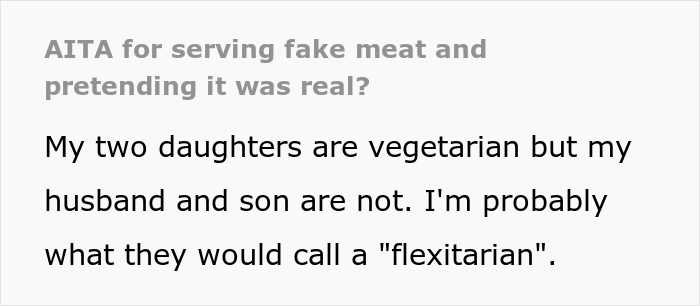
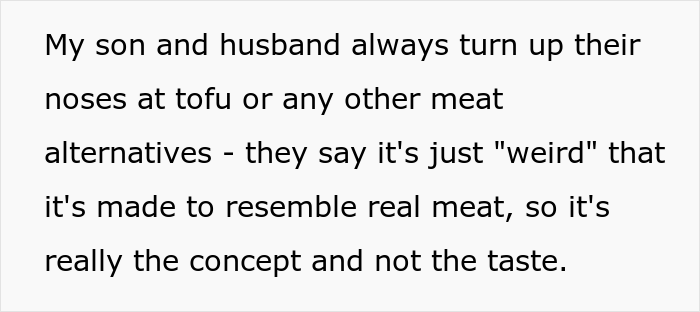
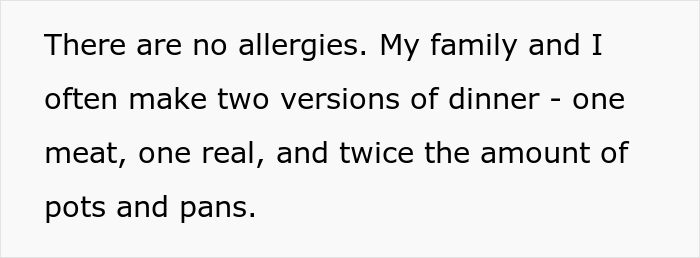






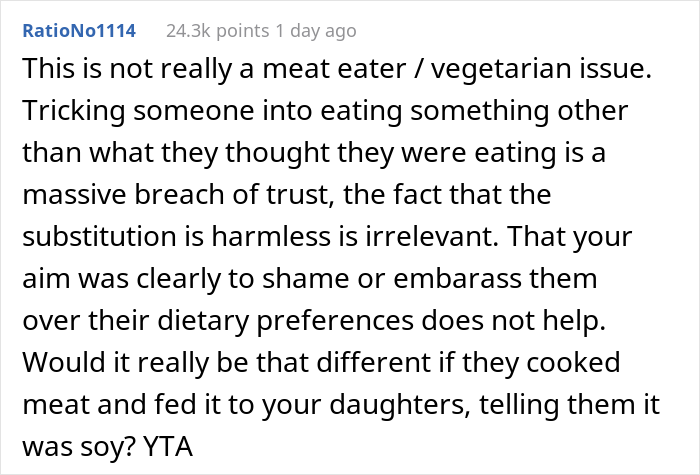
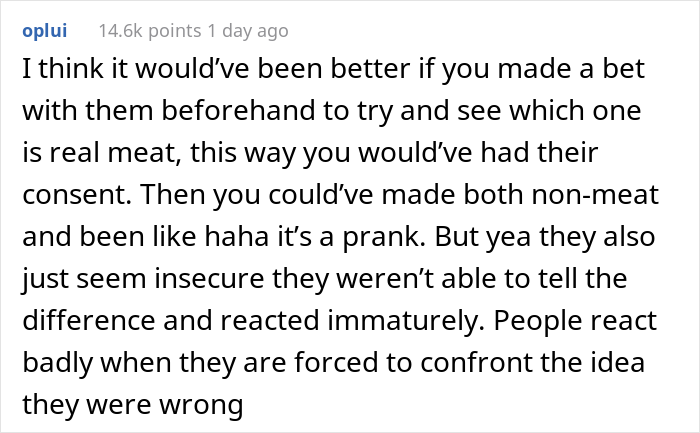
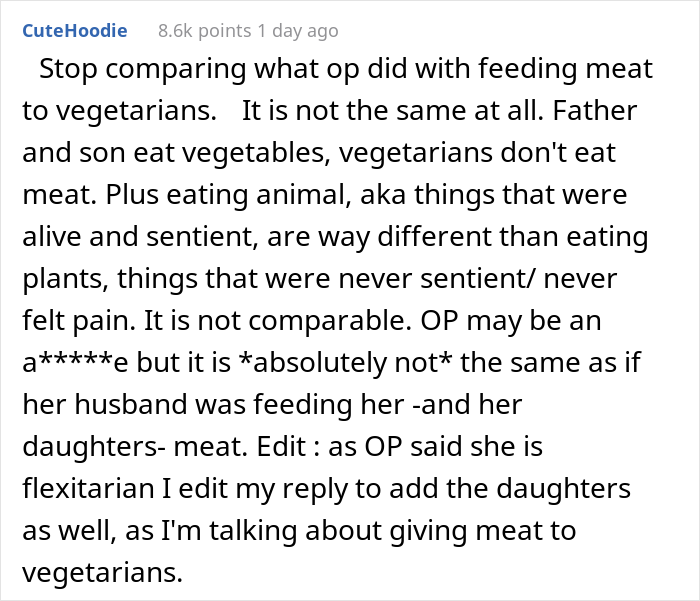

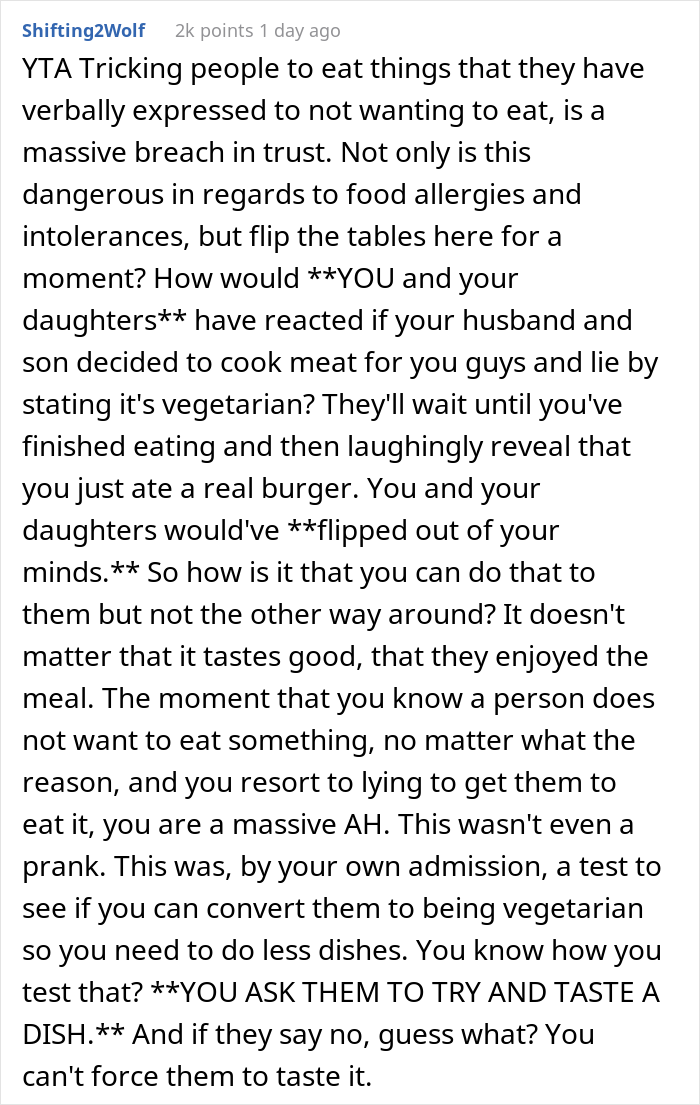

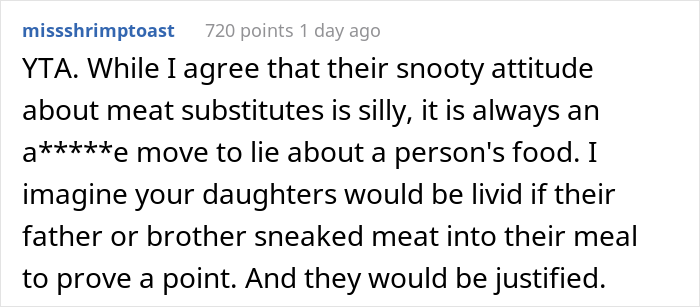



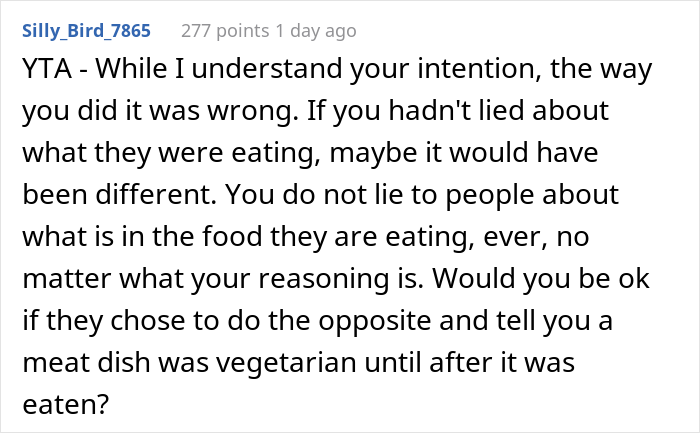

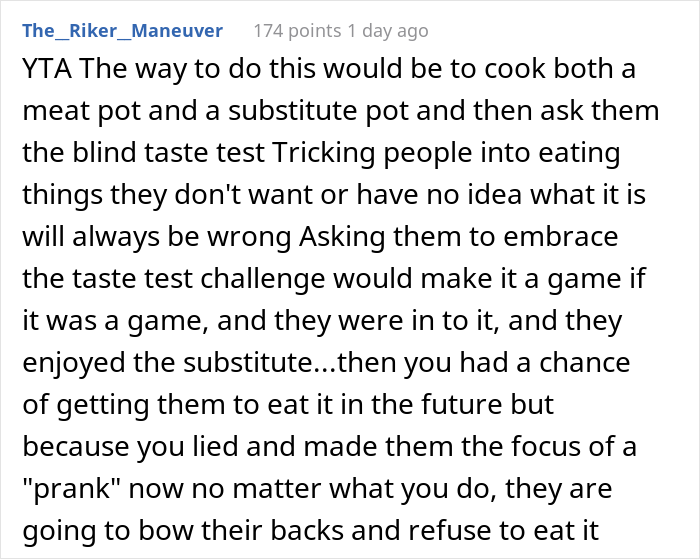
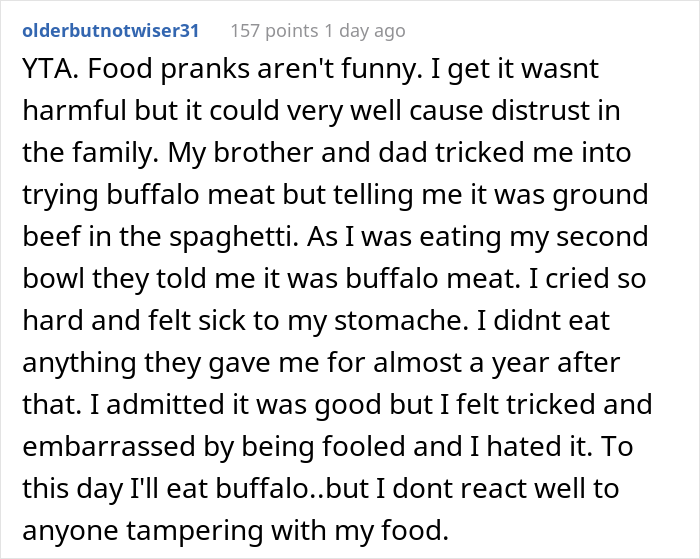

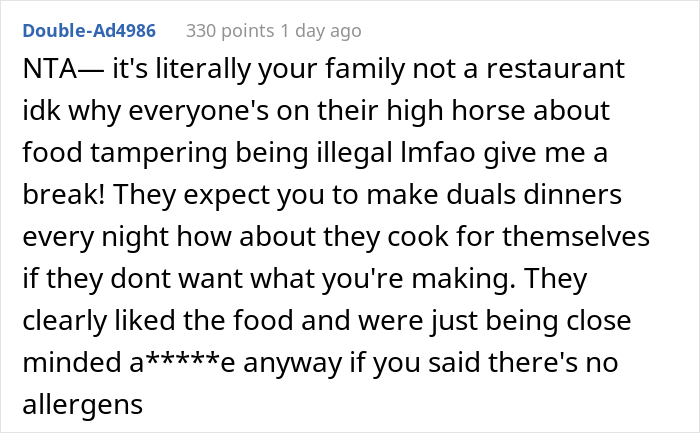

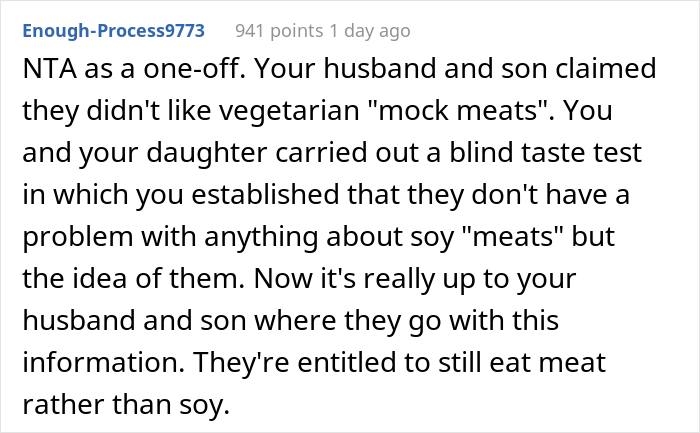
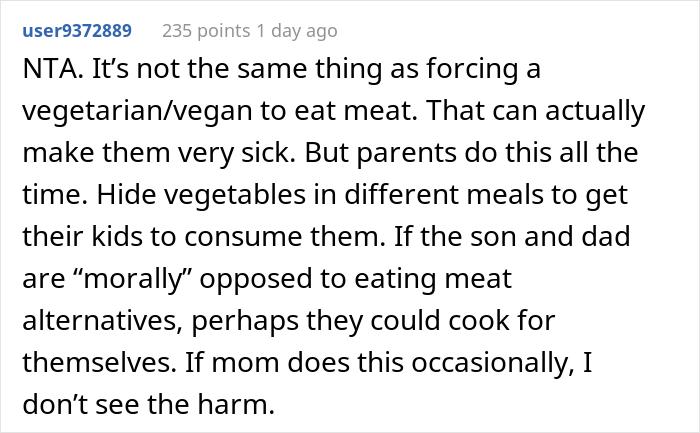
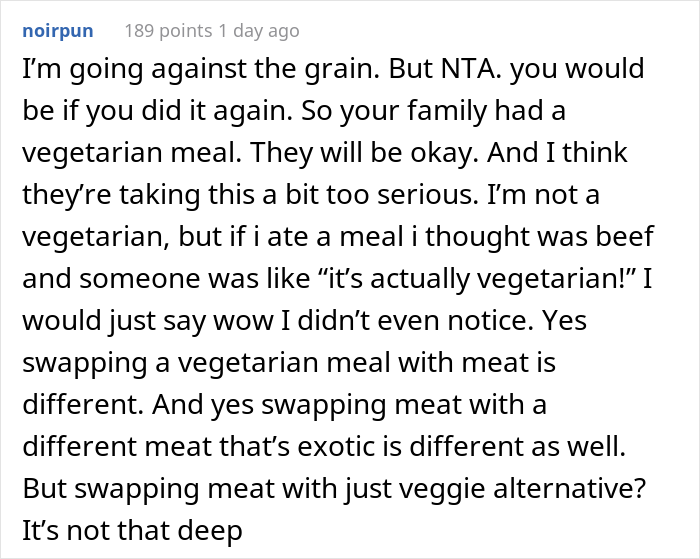




41
121